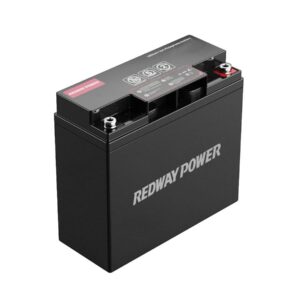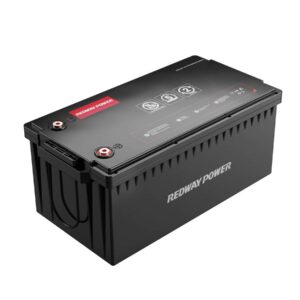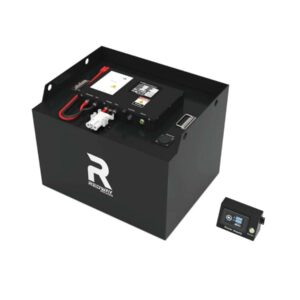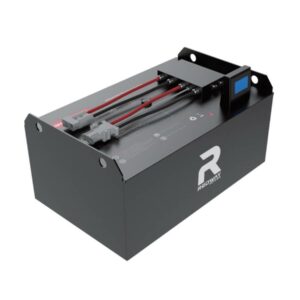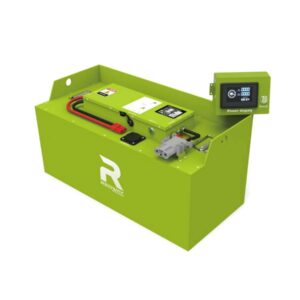Description
The 24V 160Ah Lithium Iron Phosphate (LiFePO4) Forklift Battery is a high – capacity solution from our lithium battery manufacturer. It offers reliable power, long cycle life, and customizable options for OEM clients and wholesale buyers.
Key Features
- High Energy Capacity: It provides a nominal energy output of 4.096 kWh, enabling long – term operation.
- Robust Discharge Performance: Supports continuous 160A and peak 480A currents, suitable for tough tasks.
- Long Cycle Life: Exceeds 5000 cycles at 80% DoD, reducing replacement costs.
- Advanced Battery Management System (BMS): Monitors and protects against overcharging, over – discharging, and short circuits.
- Durable Construction: With an IP65 rating and metal shell, it can endure harsh environments.
Product Description
The 24V 160Ah LiFePO4 Forklift Battery uses LiFePO4 technology at 25.6V nominal voltage.
- Compact Design: Measures 623 x 209 x 626 mm and weighs about 90 kg, fitting in tight spaces.
- Efficient Power Management: Handles a max continuous charge current of 160A for effective energy delivery.
- Wide Operating Temperature Range: Works well from – 20¡ãC to 60¡ãC.
- Low Maintenance Requirements: Eliminates watering needed by traditional lead – acid batteries.
- Customizable Options Available: Tailored for OEM clients to meet unique needs.
Benefits for Wholesale Buyers and OEM Customers
As a lithium battery manufacturer, we offer the 24V 160Ah LiFePO4 Forklift Battery with features that are highly beneficial for wholesale buyers and OEM battery customers. For wholesale buyers, the long cycle life and high energy capacity mean reduced overall costs. OEM clients can take advantage of the customizable options to integrate the battery into their equipment seamlessly. Our lithium batteries are designed to meet the strict demands of industrial applications. Using cutting – edge technology, we ensure that each battery is reliable and sustainable, making us a top choice for OEMs and those looking for bulk purchases.
Investing in our lithium batteries is a step towards a more reliable and sustainable power solution. Contact us to explore the benefits of wholesale purchasing and customization for your OEM projects.
Brand and Pricing Information
What are top 24V 160Ah LiFePO4 forklift battery brands?
Top brands for 24V 160Ah LiFePO4 forklift batteries include CATL, BYD, CALB, and EVE Energy. These manufacturers are known for producing high-performance, durable, and reliable batteries with a longer lifespan, superior safety features, and efficient energy delivery, making them popular choices for various industrial forklift applications around the world.
How do 24V 160Ah LiFePO4 battery prices vary by region?
Prices of 24V 160Ah LiFePO4 forklift batteries vary depending on factors like local taxes, shipping costs, and production region. Generally, China offers the most competitive pricing, followed by Europe and North America. Costs are also influenced by the scale of production, with bulk orders often resulting in discounted prices for large-scale users.
What factors influence 24V LiFePO4 forklift battery pricing?
Key factors influencing the pricing of 24V LiFePO4 forklift batteries include material costs, such as lithium, cobalt, and phosphate, manufacturing complexity, order quantity, shipping fees, and tariffs. Certifications, battery features like energy density, and warranty length also play significant roles in determining overall battery costs for bulk purchases.
Are warranties included in LiFePO4 forklift battery costs?
Yes, warranties are typically included in the cost of 24V LiFePO4 forklift batteries. Most manufacturers offer warranties ranging from 3 to 5 years, covering issues like manufacturing defects, capacity degradation, and performance failures under normal operating conditions. Warranties help assure buyers of the battery’s long-term reliability and performance.
How do suppliers compare for 24V 160Ah LiFePO4 batteries?
When comparing suppliers, it’s essential to look at aspects such as battery performance (charge cycles, capacity), certifications (UL, CE), warranty terms, customer service, and pricing. Additionally, evaluate the manufacturer’s reputation, production capacity, delivery times, and post-sale support to ensure reliable service for bulk battery orders in forklift applications.
Price trends for 24V 160Ah LiFePO4 forklift batteries?
The price of 24V 160Ah LiFePO4 forklift batteries has been steadily decreasing due to advancements in manufacturing technology, economies of scale, and increased competition. As demand for electric vehicles and eco-friendly solutions rises, lithium battery prices are expected to remain competitive, further benefiting large-scale users seeking cost-efficient solutions for forklifts and other industrial uses.
Manufacturers and Quality Standards
What are top LiFePO4 forklift battery manufacturers?
Leading manufacturers of LiFePO4 forklift batteries include CATL, BYD, CALB, and EVE Energy. These companies are recognized for their high-quality products that meet international safety and performance standards. They focus on advanced lithium battery technology, offering long-lasting, efficient, and eco-friendly solutions suitable for the heavy demands of forklift applications.
How to evaluate LiFePO4 battery quality for forklifts?
To evaluate the quality of LiFePO4 forklift batteries, consider certifications like UL, CE, and ISO 9001. Assess the battery’s cycle life, BMS performance, temperature tolerance, and overall energy efficiency. Reading customer reviews and checking for any history of recalls or failures can also provide insights into the manufacturer’s product reliability and service quality.
Which regions lead in LiFePO4 forklift battery production?
China is the dominant region in LiFePO4 forklift battery production, with manufacturers such as CATL and BYD leading the global market. South Korea and Japan are also significant players, especially in advanced battery technology and high-performance models. These countries drive innovation and efficiency in battery manufacturing, making them key sources for global demand.
What safety certifications do top LiFePO4 manufacturers hold?
Top LiFePO4 forklift battery manufacturers typically hold several safety certifications, including UL (Underwriters Laboratories), CE (European Conformity), ISO 9001 (quality management), UN38.3 (for transport safety), and IEC standards (international electrical standards). These certifications ensure that the batteries meet strict safety, quality, and performance requirements, reducing risks in industrial environments.
How do LiFePO4 forklift batteries compare in cost-efficiency?
LiFePO4 forklift batteries provide superior cost-efficiency in the long run compared to lead-acid batteries. Despite higher initial costs, they last 3-5 times longer, require little maintenance, and have faster charging capabilities. This results in a lower total cost of ownership over their lifespan, making them an economically sound investment for industrial operations.
What innovations define leading LiFePO4 forklift battery brands?
Leading LiFePO4 forklift battery brands are continuously innovating with better battery management systems (BMS), improved energy density, and enhanced thermal management solutions. Innovations focus on increasing battery lifespan, reducing charging times, improving safety features, and lowering overall operational costs, making them more suitable for demanding industrial environments like warehouses and factories.
Technical Specifications and Performance
What are key specifications of 24V 160Ah LiFePO4 forklift batteries?
A 24V 160Ah LiFePO4 forklift battery typically offers a high energy density, providing 3,000–5,000 charge cycles. These batteries are designed for heavy-duty applications, offering fast charging times and consistent power delivery, even under load. They are equipped with advanced Battery Management Systems (BMS) to optimize performance and extend battery life.
Which certifications ensure quality for wholesale LiFePO4 forklift batteries?
Certifications such as UL (Underwriters Laboratories), CE (European Conformity), ISO 9001 (quality management), UN38.3 (transport safety), and IEC (International Electrotechnical Commission) standards are essential for ensuring the quality of LiFePO4 forklift batteries. These certifications ensure the batteries meet rigorous safety, environmental, and performance standards required for industrial use.
How do 24V 160Ah LiFePO4 batteries perform in heavy-duty applications?
The 24V 160Ah LiFePO4 batteries are ideal for heavy-duty applications, offering long-lasting power and efficiency. They deliver consistent performance, with low self-discharge rates, enabling forklifts to operate continuously in demanding environments. Their ability to handle high currents and charge quickly makes them a preferred choice for industrial use in warehouses and factories.
What advantages do LiFePO4 batteries offer over lead-acid alternatives?
LiFePO4 batteries offer several advantages over lead-acid batteries, including a longer lifespan (up to 3,000–5,000 charge cycles), faster charging times, lighter weight, and reduced maintenance needs. These batteries are more efficient, handle higher temperatures, and are more eco-friendly due to fewer toxic materials, making them the preferred choice for modern industrial applications.
How to evaluate suppliers for bulk 24V LiFePO4 battery purchases?
When evaluating suppliers for bulk 24V LiFePO4 battery purchases, consider factors like production capacity, pricing, delivery times, quality certifications, and customer support. Research supplier reviews and ask for references or case studies. Ensuring the supplier meets regulatory and safety standards is critical, and warranty terms should also be clear and reliable.
What industry trends impact 24V 160Ah forklift battery demand?
Industry trends such as increased demand for green technologies, stricter emissions regulations, and the shift toward electric vehicles are driving demand for 24V 160Ah LiFePO4 forklift batteries. As businesses seek more sustainable, cost-effective solutions for their material handling needs, the adoption of LiFePO4 batteries is expected to continue to grow in warehouses and logistics operations.
LiFePO4 vs Lead-Acid Comparison
How do LiFePO4 and lead-acid batteries compare in energy density?
LiFePO4 batteries have a significantly higher energy density than lead-acid batteries, providing 3-4 times the energy per unit of weight. This higher density allows forklifts using LiFePO4 batteries to operate longer without needing a recharge, which improves operational efficiency and reduces downtime compared to lead-acid batteries.
What is the lifespan difference between LiFePO4 and lead-acid batteries?
LiFePO4 batteries typically last 3,000 to 5,000 charge cycles, while lead-acid batteries usually last only 500 to 1,000 cycles. This significant lifespan difference means LiFePO4 batteries offer better long-term value, requiring less frequent replacement and lower maintenance costs, making them more cost-effective over time despite the higher upfront cost.
How do charge cycles affect LiFePO4 vs lead-acid performance?
LiFePO4 batteries maintain their efficiency and capacity over thousands of charge cycles, unlike lead-acid batteries, which lose capacity much faster. This makes LiFePO4 a more durable option, as it can withstand more charge and discharge cycles, resulting in fewer replacements and lower overall maintenance costs over its lifespan.
Which battery type requires less maintenance for forklifts?
LiFePO4 batteries require minimal maintenance compared to lead-acid batteries. They do not need regular watering, equalization charging, or cleaning of corrosion buildup. This ease of maintenance significantly reduces operational downtime and maintenance costs, making LiFePO4 batteries a more convenient and cost-effective solution for industrial applications.
How do LiFePO4 and lead-acid batteries handle temperature extremes?
LiFePO4 batteries perform better in extreme temperatures, maintaining stability and efficiency in both cold and hot conditions. Lead-acid batteries tend to degrade more quickly under temperature extremes, losing performance and shortening their lifespan. This makes LiFePO4 batteries more reliable for environments with temperature fluctuations or extreme conditions.
What are the cost differences over LiFePO4 and lead-acid lifespan?
While LiFePO4 batteries have a higher initial cost, their longer lifespan (3,000–5,000 charge cycles) and lower maintenance needs make them more cost-effective in the long run. Lead-acid batteries have a shorter lifespan (500–1,000 cycles) and higher maintenance costs, meaning that although they are cheaper upfront, they ultimately cost more over time.
Industrial Application and Safety
Benefits of 24V 160Ah lithium for industrial use?
The 24V 160Ah LiFePO4 battery offers benefits like longer cycle life, faster charging, and improved energy efficiency, making it ideal for industrial equipment like forklifts. Its lightweight and high power output make it a reliable solution for reducing downtime and improving productivity in heavy-duty applications, helping businesses optimize operations and reduce costs.
Key design considerations for custom lithium solutions?
When designing custom lithium solutions, factors like the required energy capacity, charging speed, operating temperature range, and safety standards must be considered. Battery management system (BMS) integration, thermal management, and space constraints are also critical for ensuring optimal performance and safety, particularly for industrial equipment like forklifts and heavy machinery.
Safety certifications for industrial lithium batteries?
Industrial lithium batteries must meet various safety certifications, such as UL (Underwriters Laboratories), CE (European Conformity), and UN38.3 for transport safety. These certifications ensure that the batteries meet rigorous safety standards for protection against risks like short circuits, overcharging, and thermal runaway, which are particularly important in industrial environments where high energy loads are common.
Lifespan of 24V 160Ah lithium batteries?
A 24V 160Ah LiFePO4 lithium battery typically lasts between 3,000 and 5,000 charge cycles, depending on factors like usage patterns, charging habits, and operating conditions. This extended lifespan makes it a highly reliable solution for industrial applications, reducing the need for frequent battery replacements and offering better cost efficiency over the long term.
Charging requirements for 160Ah lithium systems?
Charging a 160Ah LiFePO4 lithium battery requires a compatible charger that matches the battery’s voltage and current specifications. Fast charging is an option, but it should always be done within the manufacturer’s recommended charging time and temperature limits. Proper monitoring and temperature management are crucial for safe and efficient charging in industrial environments.
Cost efficiency vs lead-acid alternatives?
While 160Ah LiFePO4 lithium batteries come with a higher initial cost than lead-acid alternatives, they offer greater cost efficiency over their lifespan. With longer cycles (3,000–5,000) and reduced maintenance, the overall cost per cycle for lithium batteries is significantly lower than for lead-acid, making them more economical in the long run for industrial applications.
Maintenance and Warranty Considerations
What are key maintenance steps for LiFePO4 forklift batteries?
To maintain LiFePO4 forklift batteries, ensure regular inspection of the battery terminals, check the battery management system (BMS), and avoid deep discharges. Store batteries in a cool, dry location and follow the manufacturer’s recommended charging cycle. Regular maintenance ensures the battery performs optimally and lasts for its intended lifespan.
How long is the warranty for LiFePO4 forklift batteries?
LiFePO4 forklift batteries typically come with warranties ranging from 3 to 5 years, depending on the manufacturer. These warranties generally cover defects, performance issues, and capacity degradation under normal usage conditions, providing buyers with peace of mind regarding long-term reliability and product quality.
What voids the warranty on LiFePO4 forklift batteries?
The warranty on LiFePO4 forklift batteries may be voided if the battery is mishandled, overcharged, exposed to extreme temperatures, or used with incompatible equipment. Other factors that could void the warranty include physical damage, tampering with the battery components, or failure to follow the manufacturer’s recommended maintenance and charging guidelines.
How to optimize charging for LiFePO4 forklift batteries?
To optimize charging, use the recommended charger designed for LiFePO4 batteries, avoid overcharging, and ensure proper temperature management during charging. Charging at the manufacturer’s specified voltage and current settings helps maximize battery life and efficiency while preventing potential damage that could shorten the battery’s lifespan.
What are common issues with LiFePO4 forklift batteries?
Common issues with LiFePO4 forklift batteries include faulty battery management systems (BMS), voltage imbalance between cells, and reduced capacity from improper charging or overuse. These issues can usually be addressed through proper maintenance, using the correct charger, and avoiding deep discharges or excessive charging times.
How to troubleshoot LiFePO4 forklift battery failures?
To troubleshoot failures, start by checking the BMS for any error codes or alerts. Inspect the terminals for corrosion or loose connections, verify the charging voltage, and test individual battery cells for balance. If issues persist, refer to the manufacturer’s troubleshooting guide or contact technical support for further assistance.



